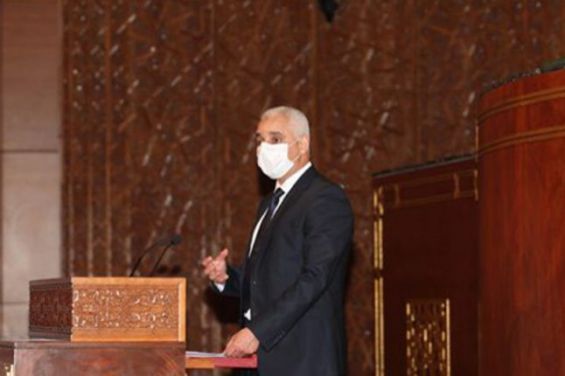Interviewed by Radio2M, Health minister Khalid Ait Taleb addressed the epidemiological situation in Morocco, the health protocol adopted by the sanitary authorities and future plans to stop the spread of the virus.
The minister stressed during this interview that Morocco is still enduring the «first wave of the pandemic», answering questions about the increasing number of daily new infections.
«First there was a lockdown, which had convincing results, and then the restrictive measures were gradually lifted, during the summer and amid Eid al Adha festivities», he recalled. Consequently, the number of infections increased in the Kingdom’s busy areas, such as the North and Casablanca.
However, the Minister insisted that the numbers were not shocking as they were «expected». «We expected that», he said, adding that «Moroccans, at some point, thought that the pandemic ended and their commitment to preventive measures loosened».
Despite rising numbers and the possibility of them increasing even more, Ait Taleb insisted that the situation «is under control». «Now, we have to focus on the seasonal flu» as winter is approaching, he explained.
«Mass vaccinations for vulnerable people and professionals will be carried on», he announced, adding that it would probably start by October.
Chloroquine and its efficiency in Morocco
As for the protocol adopted by the Kingdom to treat Covid-19 cases and questions raised about its efficiency, the Minister said that chloroquine and hydroxychloriquine «have proven its worth».
According to him, the protocol «has been efficient in preventing the virus from entering the cell», stressing that the Kingdom «had convincing and promising results» with it.
Furthermore, the Minister revealed that Morocco manufactures chloroquine sulfate and hydroxychloroquine sulfate and that they remain «available for the local market».
In addition to the Kingdom’s Covid-19 protocol, Ait Taleb explained that the country had to update its screening protocol. «At first, we had 3 national laboratories to centralize the tests, we then expanded that to 30 laboratories», he said, adding : «today we have started doing a significant number of testing, with a peak of 29,000 tests a day».
As for Morocco’s active cases, Ait Taleb revealed that most patients with a severe condition are aged between 60 and 79 years old. «They are patients with fragile underlying health conditions», he explained.
«Young people are not immune to the virus, and we have young cases who happen to have severe conditions», he argued.
Active cases and hospital capacity
Speaking of active cases, the Minister revealed that Morocco has «1,833 beds, including 280 occupied ones». He also announced that 65% of bed capacity has been occupied.
«We have a fatality rate of 1.8%, which is low. It is true that the number of positive cases worries but it is not the case for the number of deaths and severe cases», he reassured. «The magnitude of a second wave cannot be foreseen and in the event of a second outbreak countries will be quickly overtaken, including Morocco», he warned.
In order to prepare for a second wave, the Minister said that a national committee is working on a locally-made ventilator. «It takes time and several steps, such as clinical trials on animals, then on humans, solidity and safety tests (…) You cannot design a ventilator quickly and put it into use; you have to secure it and check its longevity and know when it may cause a problem».
The Minister said that his department is supporting the designers so that the product gets «validated and authorized» soon.
As for vaccine trials currently carried in Morocco, the Minister revealed that it is the first time in Moroccan history that clinical vaccine trials are undertaken in the country.
«This process allows the country to secure a transfer of expertise, have a clear vision about the safety and effectiveness of the product and create a lasting partnership», he explained, referring to countries that are developing coronavirus vaccines.
«And because one should never bet on one thing only, we have chosen several suppliers, as the capacity will not be sufficient to supply all countries», he concluded.




 chargement...
chargement...











